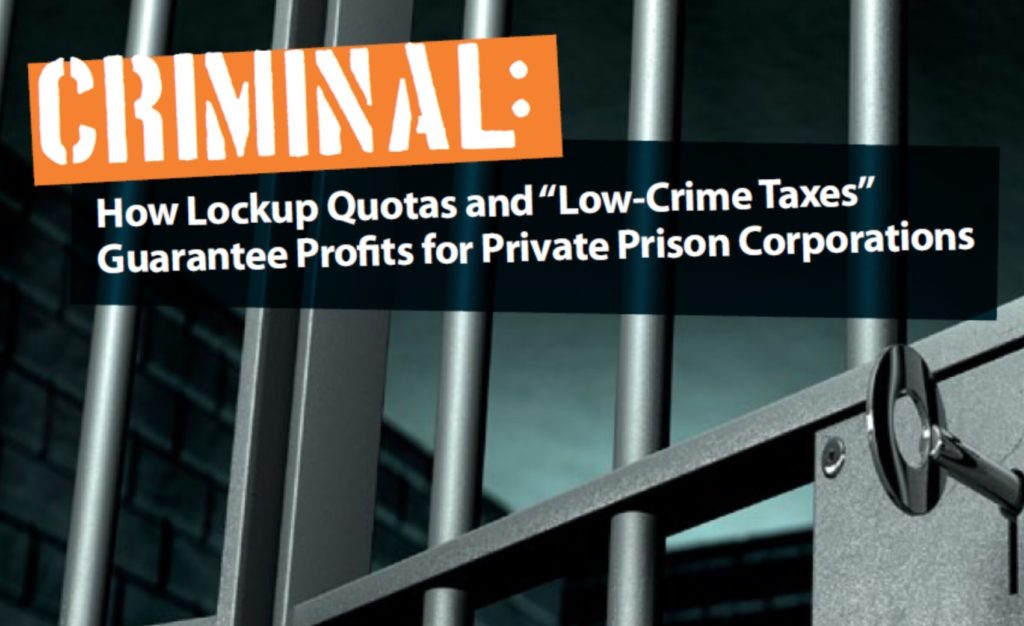
It pleases me that I can finally report some good news on a topic that has been near and dear to me for many years: private prisons.
Today, the Department of Justice announced that it would be phasing out the use of private prisons entirely within the next five years or so. There are many reasons I think private prisons are a very bad idea, and I touched on some of them in 2013’s post, A Deep Look into the Shady World of the Private Prison Industry. Here’s my introduction to that piece:
Private prisons are antithetical to a free people. Of all the functions a civilized society should relegate to the public sector, it’s abundantly clear incarceration should be at the very top of the list. Jailing individuals is a public cost that a society takes on in order to ensure there are consequences to breaking certain rules that have been deemed dangerous to the happiness and quality of life within a given population. However, the end goal of any civilized culture must be to try to keep these cost as low possible. This should be achieved by having as few people as possible incarcerated, which is most optimally achieved by reducing incidents of criminality within the population. Given incarceration is an undesirable (albeit necessary) part of any society, the idea is certainly not to incentivize increased incarceration by making it extremely profitable. This is a perverse incentive, and one that is strongly encouraged by the private prison industry to the detriment of society.
Moving along to today’s big news. The Washington Post reports:
The Justice Department plans to end its use of private prisons after officials concluded the facilities are both less safe and less effective at providing correctional services than those run by the government.
Deputy Attorney General Sally Yates announced the decision on Thursday in a memo that instructs officials to either decline to renew the contracts for private prison operators when they expire or “substantially reduce” the contracts’ scope. The goal, Yates wrote, is “reducing — and ultimately ending — our use of privately operated prisons.”
“They simply do not provide the same level of correctional services, programs, and resources; they do not save substantially on costs; and as noted in a recent report by the Department’s Office of Inspector General, they do not maintain the same level of safety and security,” Yates wrote.
The 13 privately run facilities will not close overnight. Yates said the Justice Department would not terminate existing contracts but instead review those that come up for renewal. She said all the contracts would come up for renewal over the next five years.
According to the Inspector General’s report, private prisons housed roughly 22,660 federal inmates as of December 2015. That represents about 12 percent of the Bureau of Prisons total inmate population, according to the report.
In her memo, Yates wrote that the Bureau of Prisons began contracting with privately run institutions about a decade ago in the wake of exploding prison populations, and by 2013, as the federal prison population reached its peak, nearly 30,000 inmates were housed in privately operated facilities. But in 2013, Yates wrote, the prison population began to decline because of efforts to adjust sentencing guidelines, sometimes retroactively, and to change the way low-level drug offenders are charged. She said the drop in federal inmates gave officials the opportunity to re-evaluate the use of private prisons.
The contract prisons are operated by three private corporations, according to the Inspector General’s report: Corrections Corporation of America, GEO Group and Management and Training Corporation. The bureau of prisons spent $639 million on private prisons in fiscal year 2014, according to the report.
While this is undoubtably great news, it will not affect state inmates jailed in private prisons. Although the information may not be up to date, the latest data from the ACLU puts the percentage of state inmates in private prisons at 6%. Pressure must now be put on states using private prisons to end the practice.
Meanwhile, here’s how the “industry” leaders are doing today.


Finally, I wonder what Hillary thinks of today’s news. You know, considering we learned the following in last year’s post, How Progressive – Private Prison Company Lobbyists are Raising Funds for Hillary:
As immigration and incarceration issues become central to the 2016 presidential campaign, lobbyists for two major prison companies are serving as top fundraisers for Hillary Clinton.
Corrections Corporation of America and the Geo Group could both see their fortunes turning if there are fewer people to lock up in the future.
But…

For more on the topic, see:
A Deep Look into the Shady World of the Private Prison Industry
FBI Launches Investigation into a Private Prison So Violent it is Called “Gladiator School”
Texas Teen Faces 8 Years in Jail for an Insensitive Joke on Facebook
Idaho Dumps Private Prison Company Due to “Violence, Understaffing and Over-billing”
America in 2013: Florida Football Stadium Named After a Private Prison Company
In Liberty,
Michael Krieger
Donate bitcoins: 35DBUbbAQHTqbDaAc5mAaN6BqwA2AxuE7G
Follow me on Twitter.



Until Private Prisons are eliminated there should be very severe penalties imposed on crooked judges who get kickbacks from these private Prison Enterprises.
Judge: “Guilty” $5,000
Judge: “Guilty” $5,000
Judge: “Guilty, 15 to 20 years ” $15,000
…
This is the best news I’ve heard all year. Now, we put the public pressure on for them to keep their word.
This is indeed good news. I’ve been opposed to private prisons since I first learned of them during the nineties.
I’ve said all along that “Orange Is The New Black” was more of a documentary.